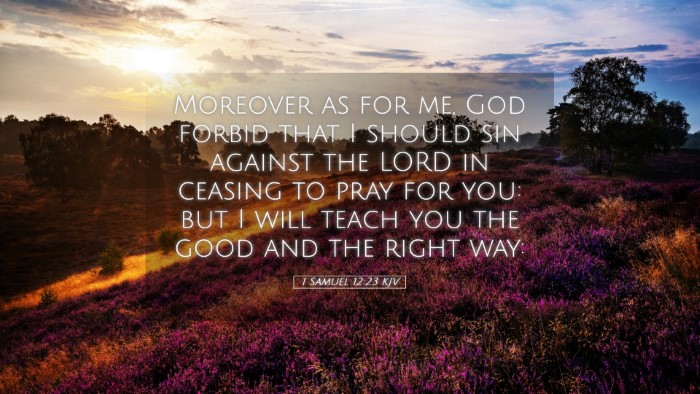Commentary on 1 Samuel 12:23
Verse: "Moreover as for me, God forbid that I should sin against the LORD in ceasing to pray for you: but I will teach you the good and the right way."
Introduction
This verse occurs in a moment of pivotal significance within the narrative of 1 Samuel. Here, Samuel assumes a role not just of leadership but also of spiritual responsibility. He acknowledges his duty to intercede for the people of Israel while also guiding them in the fear of the Lord.
Theological Implications
Samuel's declaration reveals critical theological insights concerning intercession, communal responsibility, and the importance of righteous leadership.
Intercession as a Duty
Matthew Henry emphasizes that prayer is vital for spiritual health; Samuel views ceasing to pray as a sin. This perspective underscores the weight of spiritual leaders' responsibilities toward their congregations. The act of praying for others reflects selflessness and devotion.
The Significance of Teaching
Samuel's commitment to teach "the good and the right way" indicates a dual responsibility: prayer and instruction. Albert Barnes notes that teaching involves not only conveying knowledge but demonstrating how to live righteously, thus embodying the lessons imparted.
Understanding Sin Against God
Adam Clarke elaborates on the nature of sin referenced by Samuel. To neglect prayer is to undermine one's relationship with God and betray the trust of the people. Samuel’s statement reflects a deep understanding of his obligations and the spiritual consequences of failing to fulfill them.
Practical Applications
For pastors and church leaders today, this verse serves as a poignant reminder of the importance of intercessory prayer and solid teaching. Their roles transcend administration; they are spiritual guides called to foster deeper connections with God through prayer and the Word.
- Emphasis on Intercession: Leaders should prioritize prayer in their ministries.
- Role of Teaching: Educating believers on living rightly should be at the forefront of ministry.
- Community Responsibility: The spiritual condition of the community is a shared responsibility, calling for collective prayers and teachings.
Contextual Considerations
Understanding the context of this verse enhances its significance. The Israelites demanded a king, rejecting God’s direct rule. Samuel’s response reflects both their request and the resultant shift in governance, but importantly, it profoundly embeds the need for divine guidance amidst human leadership.
Historical Context
Matthew Henry points out that the plea for a king represents not only a rejection of Samuel but also of God himself. Samuel, in this verse, reassures the people that even amidst human rulers, divine intercession remains crucial.
Leadership Transition
With the rise of kingship, the balance between human authority and divine sovereignty is critical. Albert Barnes suggests this verse becomes a warning not to neglect the divine throughout political shifts, affirming that God remains the ultimate authority and source of moral teaching.
Reflective Questions
Pastors and students may reflect on several questions:
- In what ways do we actively pray for others in our communities?
- How can we ensure our teachings align with God's good and right ways?
- What practical steps can we take to nurture a culture of prayer within our congregations?
Conclusion
1 Samuel 12:23 encapsulates a profound commitment to prayer and moral instruction. Through Samuel's words, we are reminded of the serious responsibility leaders carry in both praying for their people and teaching them the ways of the Lord. Such a commitment ensures that God remains at the center of their corporate journey, guiding them in righteousness.


